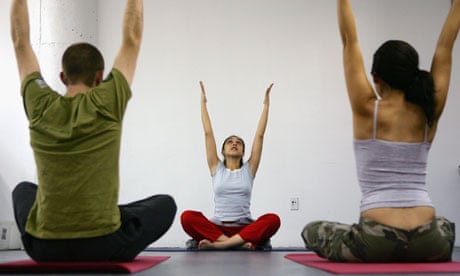Doing yoga is a more effective way for people with lower back pain to become more mobile than the treatments currently offered by GPs, according to new research.
The study found that back pain sufferers recorded greater improvements in everyday physical tasks such as walking, bending down and getting dressed if they did weekly yoga sessions.
Participants who had practised yoga reported enhanced function compared with those receiving standard care, even nine months after the yoga classes had finished.
Previous, smaller studies have suggested yoga could be beneficial to back pain sufferers. However, these have often involved just one teacher and have not included long-term follow-up.
Back pain is estimated to affect 80% of adults at some point in their lives, and one in five people visits their GP in any given year because of it.
The condition, defined as chronic if it lasts longer than six weeks, is the second most common cause of long-term disability after arthritis and second only to stress as a cause of absence from work. It costs the NHS around £1bn per year and the annual cost to the economy has been estimated at £20bn.
Existing treatment options include painkillers, spinal manipulation, acupuncture, exercise classes and cognitive behavioural therapy.
"In the past when you had back pain, you were told to lie down until it passed," said Prof David Torgerson, director of the York Trial Unit at the University of York, who led the study.
"These days the main advice is to keep your back active. It seems yoga has more beneficial effects than usual care including other forms of exercise, although we have not carried out a direct comparison.
"We are still carrying out the economic analysis but it is likely yoga could reduce the costs of back pain both for patients and for the NHS."
Twenty experienced yoga teachers from the British Wheel of Yoga and Iyengar Yoga were trained to deliver a beginner level course of 12 yoga sessions specially designed to be safe and beneficial to those with lower back pain.
A group of 156 patients with chronic lower back pain were assigned to have the 75-minute yoga classes in north and west London, Manchester, York and Truro, in addition to normal GP care, while a control group of 157 just saw their GPs.
Participants filled in a 24-point questionnaire on whether their condition prevented them from doing everyday tasks. Lower scores equated to better function.
Those who did the yoga scored on average 2.17 points lower than those who did not. Three and nine months later, their scores were still 1.48 and 1.57 points lower respectively.
Participants also reported lower overall pain levels on average. However, this effect did not reach statistical significance. Around 60% of those in the yoga group continued with their practice after the classes.
The study is published in the Annals of Internal Medicine.
Rates of reported cases of back pain have doubled in the past 40 years in England, a trend seen in other Western countries. Some believe this is a result of higher levels of obesity, stress and depression, while others suggest people are more willing to report the condition.
When the UK's National Institute for Health and Clinical Excellence – which draws up guidelines on the best treatments – last reviewed treatments for lower back pain in May 2009, it ruled that exercise, spinal manipulation and acupuncture were cost-effective treatments.
"Yoga is one of a number of treatments that have now been shown to be effective for back pain," said Martin Underwood, professor of primary care research at Warwick Medical School.
"The study shows it having a small to moderate average effect for patients, meaning there will be some people who experience little or no effect and other people for whom it has substantial benefit. Unfortunately we don't yet know which patients respond to which treatments."

Comments (…)
Sign in or create your Guardian account to join the discussion